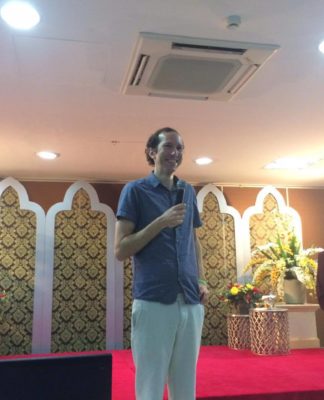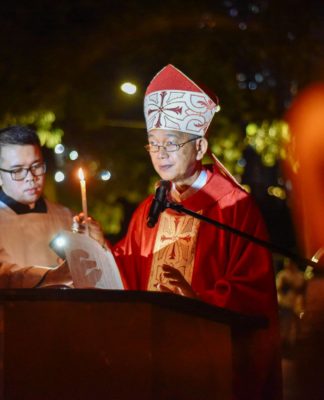
ASIA’S religions agreed to work together to achieve peace amid rising conflict and extremism globally, after three days of meetings in Manila hosted by the Catholic Bishops’ Conference of the Philippines (CBCP) and the University of Santo Tomas.
The 7th General Assembly of the Asian Conference of Religions for Peace (ACRP) saw the region’s religious leaders calling for more dialogue among different faiths and increased public awareness to build support for efforts to promote peace.
The assembly brought the region’s religious leaders in Manila for the first time, with UST hosting the opening of the meet as well as a women’s conference, which elected UST Graduate School Dean Dr. Lilian Sison as head of the ACRP Women’s Committee (see related story …)
Formed in 1974, the ACRP seeks to harness Asia’s religious traditions to promote peace, meeting every five years.
In his keynote speech, Archbishop Felix Anthony Machado, former undersecretary of the Vatican’s Pontifical Council for Interreligious Dialogue, said efforts to achieve peace must be unwavering.
“To build peace, collaboration of religions is necessary. Believers across religious boundaries need to multiply voices, by crying in season and out of season against hatred, violence, aggression, and war,” he said.
United Nations Secretary General Ban Ki Moon gave a video message, commending the ACRP for “its commitment to bring peace in Asia and to the world.”
President Gloria Macapagal-Arroyo and National Security Adviser Norberto Gonzales attended the opening last Oct. 17 at the Medicine Auditorium.
Machado recalled that years ago, world religions had already committed to peace by strongly denouncing violence and terrorism through “peaceful and fraternal co-existence between people of different ethnic groups, culture, and religions.”
He called out on religious leaders from the Philippines, Japan, China, Indonesia, India, Pakistan, and North and South Korea, among others, to hold inter-religious dialogues to reconcile differences in beliefs, ideologies, and cultures.
CBCP president Archbishop Angel Lagdameo described peace as an elusive dream, but an achievable one if people continue to seek and pursue it.
“Peace is the work, result, and fruit of solidarity,” Lagdameo said, quoting the late Pope John Paul II, in his welcome remarks.
The Japanese government’s representative to peace-building efforts in Sri Lanka, Yasushi Akashi, said comprehensive efforts should be undertaken to facilitate a “culture of peace.”
“There is no such thing as cheap peace. You should work hard for peace making and peace keeping,” Akashi said in his keynote speech.
Commission reports
At the Manila Hotel last Oct. 18, the conference discussed reports from five commissions on pursuing reconciliation, promoting peace education, building communities, working for sustainable development, and social justice.
The report of the first commission, “Peacemaking through Shared Security and Conflict Transformation,” said reconciliation among countries is vital for a better future since conflicts from the past could not just be forgotten and become confined forever in history.
The second commission report, which focused on peacemaking through human rights and peace education, said religions and their leaders should be in unity to achieve peace and that Asian traditions are rooted on human dignity and human rights.
Peacemaking through common values and community-building were the basis of six ethical norms or the “basic common values” outlined in the third report: 1) to treat others as you would like to be treated, 2) to treat every human being humanely, 3) to respect human life, 4) to be honest, 5) to act faithfully, and 6) to be responsible for others’ happiness.
Meanwhile, the fourth commission’s report, “Peacemaking through sustainable development and social justice,” reminded the audience that “good governance is the key to sustainable development.”
Another report, “Peacemaking through healing the past and building the future,” dealt with the situation in Mindanao.
The reports considered “six dimensions and the operative values”: personal and familial integrity, democracy and promotion of human rights, poverty eradication, intercultural understanding and solidarity, disarmament and cessation of hostilities, and environmental protection.
Aside from the women’s meeting in UST last month, a youth assembly was also held in Davao ahead of the ACRP assembly.
Media blamed
ACRP officials said media needed to play a role in peace-building, noting that instead of helping to attain peace, media are too obsessed on sensational stories and making profits.
In a press conference a day before the start of ACRP at the Miguel de Benavides Library Auditorium, Lourdes Mastura, ACRP-Philippines president, criticized the media for casting Muslims in a bad light.
“If media continue writing news in favor of their market, we will have a problem achieving peace. You cannot build peace overnight,” Mastura said.
Media have bared their prejudices in the on-going insurgency in Mindanao by using terms and labels like “Moro rebels” and “Muslim kidnappers,” she claimed.
“Why is it when a crime is committed by a Muslim, many reporters always include it as identification? But when a Christian commits the crime, no label is given to the culprit.” she said.
Filipinos, meanwhile are “unable to hear balanced news” despite the availability of technology, said professor Pablito Baybado of the UST Institute of Religion.
“Coming together, we hear many frustrations expressed by the youth leaders, even though we live in a world filled with the latest communication technology. We are unable to hear balanced views,” said Baybado, reading the position paper of youth leaders during the Asian Youth Leaders Summit held last Oct. 12 to 16 in Davao City.
“We urge the media to see us as allies in a common path to peace and fill the region with news of hope.” Nikki Q. Angulo, John Constantine G. Cordon, Aura Marie P. Dagcutan and Danielle Clara P. Dandan
















